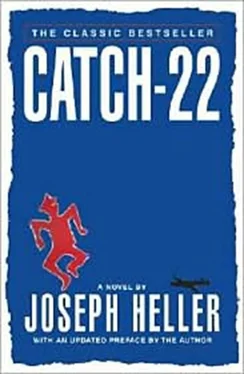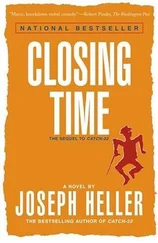Not even the chaplain could bring Doc Daneeka back to life under the circumstances. Alarm changed to resignation, and more and more Doc Daneeka acquired the look of an ailing rodent. The sacks under his eyes turned hollow and black, and he padded through the shadows fruitlessly like a ubiquitous spook. Even Captain Flume recoiled when Doc Daneeka sought him out in the woods for help. Heartlessly, Gus and Wes turned him away from their medical tent without even a thermometer for comfort, and then, only then, did he realize that, to all intents and purposes, he really was dead, and that he had better do something damned fast if he ever hoped to save himself.
There was nowhere else to turn but to his wife, and he scribbled an impassioned letter begging her to bring his plight to the attention of the War Department and urging her to communicate at once with his group commander, Colonel Cathcart, for assurances that-no matter what else she might have heard-it was indeed he, her husband, Doc Daneeka, who was pleading with her, and not a corpse or some impostor. Mrs. Daneeka was stunned by the depth of emotion in the almost illegible appeal. She was torn with compunction and tempted to comply, but the very next letter she opened that day was from that same Colonel Cathcart, her husband’s group commander, and began:
Dear Mrs., Mr., Miss, or Mr. and Mrs. Daneeka: Words cannot express the deep personal grief I experienced when your husband, son, father or brother was killed, wounded or reported missing in action.
Mrs. Daneeka moved with her children to Lansing, Michigan, and left no forwarding address.
Yossarian was warm when the cold weather came and whale-shaped clouds blew low through a dingy, slate-gray sky, almost without end, like the droning, dark, iron flocks of B-17 and B-24 bombers from the long-range air bases in Italy the day of the invasion of southern France two months earlier. Everyone in the squadron knew that Kid Sampson’s skinny legs had washed up on the wet sand to lie there and rot like a purple twisted wishbone. No one would go to retrieve them, not Gus or Wes or even the men in the mortuary at the hospital; everyone made believe that Kid Sampson’s legs were not there, that they had bobbed away south forever on the tide like all of Clevinger and Orr. Now that bad weather had come, almost no one ever sneaked away alone any more to peek through bushes like a pervert at the moldering stumps.
There were no more beautiful days. There were no more easy missions. There was stinging rain and dull, chilling fog, and the men flew at week-long intervals, whenever the weather cleared. At night the wind moaned. The gnarled and stunted tree trunks creaked and groaned and forced Yossarian’s thoughts each morning, even before he was fully awake, back on Kid Sampson’s skinny legs bloating and decaying, as systematically as a ticking clock, in the icy rain and wet sand all through the blind, cold, gusty October nights. After Kid Sampson’s legs, he would think of pitiful, whimpering Snowden freezing to death in the rear section of the plane, holding his eternal, immutable secret concealed inside his quilted, armor-plate flak suit until Yossarian had finished sterilizing and bandaging the wrong wound on his leg, and then spilling it out suddenly all over the floor. At night when he was trying to sleep, Yossarian would call the roll of all the men, women and children he had ever known who were now dead. He tried to remember all the soldiers, and he resurrected images of all the elderly people he had known when a child-all the aunts, uncles, neighbors, parents and grandparents, his own and everyone else’s, and all the pathetic, deluded shopkeepers who opened their small, dusty stores at dawn and worked in them foolishly until midnight. They were all dead, too. The number of dead people just seemed to increase. And the Germans were still fighting. Death was irreversible, he suspected, and he began to think he was going to lose.
Yossarian was warm when the cold weather came because of Orr’s marvelous stove, and he might have existed in his warm tent quite comfortably if not for the memory of Orr, and if not for the gang of animated roommates that came swarming inside rapaciously one day from the two full combat crews Colonel Cathcart had requisitioned-and obtained in less than forty-eight hours-as replacements for Kid Sampson and McWatt. Yossarian emitted a long, loud, croaking gasp of protest when he trudged in tiredly after a mission and found them already there.
There were four of them, and they were having a whale of a good time as they helped each other set up their cots. They were horsing around. The moment he saw them, Yossarian knew they were impossible. They were frisky, eager and exuberant, and they had all been friends in the States. They were plainly unthinkable.
They were noisy, overconfident, empty-headed kids of twenty-one. They had gone to college and were engaged to pretty, clean girls whose pictures were already standing on the rough cement mantelpiece of Orr’s fireplace. They had ridden in speedboats and played tennis. They had been horseback riding. One had once been to bed with an older woman. They knew the same people in different parts of the country and had gone to school with each other’s cousins. They had listened to the World Series and really cared who won football games. They were obtuse; their morale was good. They were glad that the war had lasted long enough for them to find out what combat was really like. They were halfway through unpacking when Yossarian threw them out.
They were plainly out of the question, Yossarian explained adamantly to Sergeant Towser, whose sallow equine face was despondent as he informed Yossarian that the new officers would have to be admitted. Sergeant Towser was not permitted to requisition another six-man tent from Group while Yossarian was living in one alone.
“I’m not living in this one alone,” Yossarian said with a sulk. “I’ve got a dead man in here with me. His name is Mudd.”
“Please, sir,” begged Sergeant Towser, sighing wearily, with a sidelong glance at the four baffled new officers listening in mystified silence just outside the entrance. “Mudd was killed on the mission to Orvieto. You know that. He was flying right beside you.”
“Then why don’t you move his things out?”
“Because he never even got here. Captain, please don’t bring that up again. You can move in with Lieutenant Nately if you like. I’ll even send some men from the orderly room to transfer your belongings.”
But to abandon Orr’s tent would be to abandon Orr, who would have been spurned and humiliated clannishly by these four simple-minded officers waiting to move in. It did not seem just that these boisterous, immature young men should show up after all the work was done and be allowed to take possession of the most desirable tent on the island. But that was the law, Sergeant Towser explained, and all Yossarian could do was glare at them in baleful apology as he made room for them and volunteer helpful penitent hints as they moved inside his privacy and made themselves at home.
They were the most depressing group of people Yossarian had ever been with. They were always in high spirits. They laughed at everything. They called him “Yo-Yo” jocularly and came in tipsy late at night and woke him up with their clumsy, bumping, giggling efforts to be quiet, then bombarded him with asinine shouts of hilarious good-fellowship when he sat up cursing to complain. He wanted to massacre them each time they did. They reminded him of Donald Duck’s nephews. They were afraid of Yossarian and persecuted him incessantly with nagging generosity and with their exasperating insistence on doing small favors for him. They were reckless, puerile, congenial, naive, presumptuous, deferential and rambunctious. They were dumb; they had no complaints. They admired Colonel Cathcart and they found Colonel Korn witty. They were afraid of Yossarian, but they were not the least bit afraid of Colonel Cathcart’s seventy missions. They were four clean-cut kids who were having lots of fun, and they were driving Yossarian nuts. He could not make them understand that he was a crotchety old fogey of twenty-eight, that he belonged to another generation, another era, another world, that having a good time bored him and was not worth the effort, and that they bored him, too. He could not make them shut up; they were worse than women. They had not brains enough to be introverted and repressed.
Читать дальше












